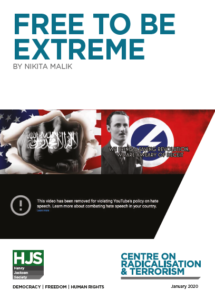 This study of online extremism finds that Islamists pose a greater risk online than the far-right.
This study of online extremism finds that Islamists pose a greater risk online than the far-right.
Contrary to growing assumptions that far-right extremists pose the greatest threat online, Free To Be Extreme highlights how Islamists are committing more serious offences in the online space.
The finding ranks those convicted of online-based extremism offences into six bands, according to 20 indicators of the seriousness of harm they cause. The classification system’s metrics include audience size, lack of remorse, prejudice towards minority groups, and glorification of violence – none of the classification metrics are unique to any one ideology.
According to the classification system, 65.5% of far-right offenders were situated in the lowest three risk bands, indicating lower harm. Just 34.4% of far-right offenders were in the highest three risk bands. In contrast, 52% of Islamists convicted of offences were in these higher bands and 48% were in the lower bands.
The report also finds that Islamist offenders convicted of online extremist offences received prison sentences of, on average, three times (2.99x) as long as their far right counterparts. Islamists received on average 73.4 months, while far-right offenders received 24.5 months. However, the report’s author today warns that one factor in this sentence disparity is a failure by the Home Office to proscribe far-right groups, making them harder to prosecute than their Islamist equivalents.
The report also finds Islamist extremists were more likely commit offences on encrypted platforms, where they would be harder to monitor, than their far-right counterparts.
The classification system comes in a report, commissioned by Facebook, to develop new ways of identifying those who abuse social media platforms to spread extremism and hate of all ideologies. The six band risk categorisation system is designed to help social media firms target their responses to the most dangerous and harmful offenders.
The report includes individuals convicted between 2015 and 2019 of ‘extremism-related’ offences online, comprised of terrorism offences and hate-based offences with an online element. Data was collected from datasets maintained by the Crown Prosecution Service, Community Security Trust, and TellMAMA.
The report proposes a series of recommendations to tackle online extremism, including:
The Government should proscribe additional far-right organisations, which would allow terrorist offences to be used against offenders.
A new independent regulator on online harms should assist technology companies keep track of the most harmful offenders, using a historical record of those using platforms to spread hateful views.
Extremist offenders tend to use better known platforms to disseminate views, in conjunction with lesser known, ‘alt-tech’ platforms. Profiles in the higher level of the harm grading system should be handled by a new research department funded by social media companies, and information on these profiles should be shared between companies.
Social media companies should ensure that free speech is protected, particularly for those who criticise extremist content and religion, or use satire, irony, or art to do so.
READ THE REPORT HERE
In the words of the author:
“Islamists profiled in the report commit more dangerous, harmful, and complex offences online. They do so with intent and to a large audience. Contrary to some narratives, it is Islamists that continue to pose a severe risk online.
However, it is also true that the lack of far-right groups subject to proscription in the UK, when compared to Islamist groups, has left the authorities reliant on hate crime legislation rather than specific terrorist offences which carry heftier sentences. The Government will need to keep this situation under review in a fast-moving online world, where offending causes real and significant harm.
That this research has been commissioned by Facebook is indicative of how seriously tech platforms are taking extremism. Our new risk categorisation system can assist companies like Facebook to develop new tools to consider their response to harmful extremists.”
Nikita Malik
Director of the Centre on Radicalisation and Terrorism at the Henry Jackson Society


